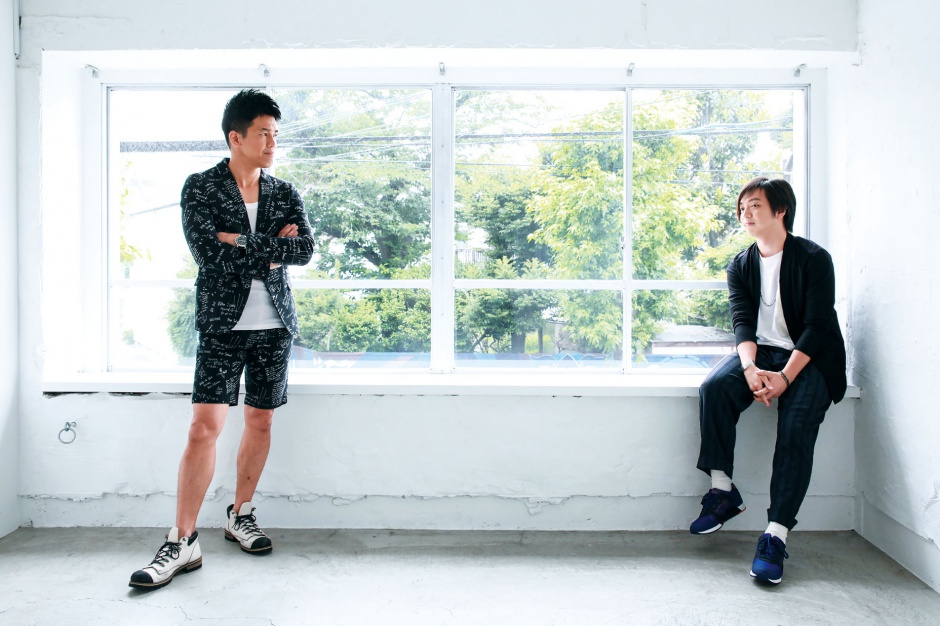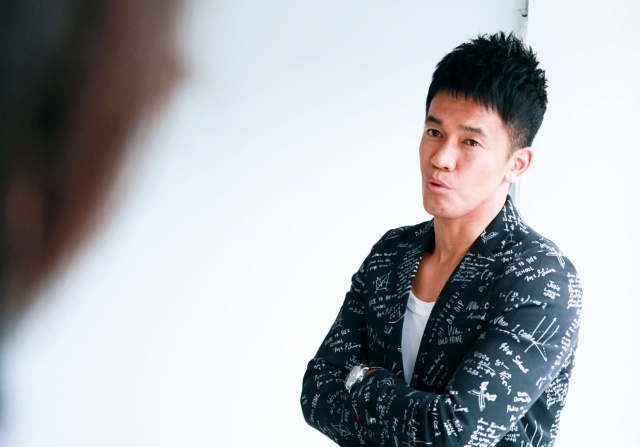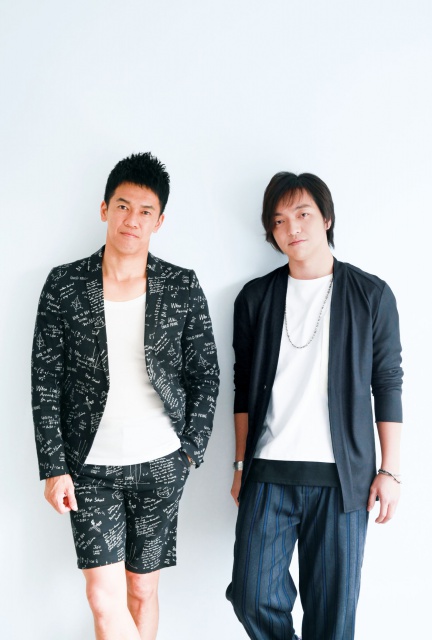vol.
013
JULY
2016
vol.013 / Roundtable
What it Takes to Be an Entertainer
So Takei (king of beasts) × Daichi Miura (musician)

Players’ Talk — an opening interview that reveals through glimpses of a sporting mindset the spirit of expressive people who support the culture of Tokyo. For this first installment we welcome So Takei and Daichi Miura to talk about how each competes on his own stage.
Miura: I first learned about you when you appeared on a variety show I was watching. You were explaining how to bring down all different sorts of animals and it was so hilarious it had me in stitches.
Takei: Well, I am the King of Beasts.
Miura: (Laughs) That got me started thinking about you a lot and as I checked the Internet and started reading articles I was shocked to learn that you’d started out as the national champion in decathlon. But what really surprised me was how dedicated you are to self-analysis. I read in an article somewhere that you kept a daily record of all kinds of data so that you could try to mark a new personal best every day.
Takei: That’s right, I kept careful records. I’ve been active ever since I was a little kid and was pretty good at moving my body, so I had this idea that one day I might be successful in sports. I figured the key to success in sports was to be able to execute things exactly as I saw them in my head, and if I could cultivate the ability to do that then a path was sure to open up.
Miura: When did you decide that?
Takei: When I was in elementary school. From that point on, it was self-analysis every day.
Miura: That’s pretty incredible for a kid still in elementary school, isn’t it?
Takei: Not at all. I was good at sports but I wanted to figure out how to turn sports into the real mainstay of my life, rather than just taking a gamble. After thinking about it I decided the key was to maintain top condition at all times, whether in competition or in training — to eliminate bad days. Starting in high school, then, I kept track of data on my own body for a solid six years.
Miura: Six whole years!
Takei: That’s right. I kept track of all sorts of fine-grained data — the inside and outside temperature and humidity six times a day, my body temperature everywhere I could hold a thermometer, even the materials my clothes were made of — and recorded my condition and time whenever I ran the 50 meters. That made it easy to see the conditions under which I performed well or poorly, and then I could make adjustments to maintain my condition. In no time at all I was in top form just about every day. (Laughs)

Miura: So you figured out your own biorhythm, right? I think it’s amazing that you posed a problem and then managed to find the answer all by yourself. A lot of times people just never find an answer.
Takei: There’s always an answer. But this wasn’t an answer that would work for everyone in the same way; it was just the answer that worked for my body. I can still feel what it was like then in my mind and in my skin, so now even if I get sick I can use the techniques I acquired then to aid my recovery. I figure I’ve probably got more tools in my toolbox than anybody else in the world. It’s kind of freaky, really. (Laughs)
Miura: That is kind of. . . freaky. You know, lately I’ve been thinking a lot about how indispensible the Internet has become, and about the popularity of social media, and how easy it is to let the way other people evaluate you become a substitute for who you really want to become. It’s like looking into a mirror that somebody else has made and believing that the reflection it shows is the real you, and then it gets harder and harder to face yourself square on. How do I need to move to feel my best? How do I need to feel to enable myself to move optimally? What do I want to do most of all right now? The critical thing is to think things though carefully in my own head, to analyze myself on my own. So it’s been really inspiring to see how you’ve been able to hold steady in putting that sort of thing into practice for so long.
Takei: I’m really glad to hear I’ve made a little bit of a difference to someone like you who’s working in a totally different field.
Miura: I’ve decided, like you did, to try as much as possible to eliminate bad days, and part of that is not doing anything special before going on stage. I don’t have any “lucky routine” I feel I have to do to make a show a success, and I try to avoid setting things up in a way where anything absolutely has to be “just right” in order to work. I don’t want the quality of my performance to be swayed by anything peripheral.
Takei: So you’re always working to ensure you can maintain a constant high level of performance regardless of differences in outside factors?
Miura: That’s right.
Takei: To put it another way, then, instead of just trying to extend your height, you’re working to extend your breadth and depth, right?
Miura: I guess so. Song and dance are important to me, but I’m acutely conscious of wanting those who watch me to feel entertained in the end. I want to get in touch with the audience’s feelings, and I hope what I do makes their lives just a little bit richer. That’s the most important thing so I’ve never been satisfied with just my singing or dancing on its own.

Takei: So you’re not so much seeking to stretch what you’re good at as to conquer your weak points?
Miura: Right. I want to be able to maximize the number of things I can do well.
Takei: So you’re filling up your own toolbox, then. What you’re describing reminds me a lot of the way I practiced for the high jump. Let’s say a high jumper has muscle strength of 10. If he could reach the highest height possible using all 10, and do so with the best possible technique, he’d mark the best possible record, right? But if outside factors come into play, like a strong gust of wind that catches him from behind. . .
Miura: Then he might lose his balance, hit the bar, and foul out.
Takei: Right. So as you refine your technique for height alone, you lose breadth and your risk of failure grows, too. I didn’t like this at all. I felt it would narrow my potential. I think this holds for sports generally, but athletes are specialists who have refined their own technique in ways nobody else can imitate. This is awesome in its way, of course, but it made me nervous. The reason being that if anything interferes with the technique you end up performing like an amateur. I thought this was the biggest risk in sport. So when I practiced the high jump, I worked exclusively on clearing the height without touching the bar. When I was training, I would start my approach from a different location, take off in a different place, and try clearing the bar in a different way every time. I figured there was only one truth about the high jump: you succeed if you clear the height without touching the bar.
Miura: Jumping the way you want to jump, that’s the essence of sports that you were talking about earlier, isn’t it?
Takei: Right. It’s like drinking water. You can drink water without having any particular image in your head; it’s just something you do as part of your everyday life. But if you send a directive from your brain to “drink like this,” then suddenly you’ve entered the world of sport. Wanting to do something and then finding a way to do it is the primitive, true nature of sport.



